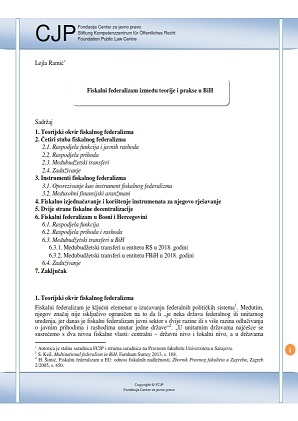Fiskalni federalizam između teorije i prakse u BiH
Fiscal Federalism between Theory and Practice in Bosnia and Herzegovina
Author(s): Lejla Ramić
Subject(s): National Economy, Economic policy, Government/Political systems, Political economy, Economic development, Public Finances, Fiscal Politics / Budgeting
Published by: Fondacija Centar za javno pravo
Keywords: Bosnia and Herzegovina; federalism; fiscal policy; fiscal federalism; fiscal decentralization; government; budget; public debt; credit rating;
Summary/Abstract: In this article the author discusses theoretical framework of fiscal federalism through his four keys determinants: assignment of functions and expenditures, public revenue assignment, intergovernmental transfers and borrowing. Fiscal federalism deals with these issues which are closely related with fiscal decentralization. Guided by these determinants, the author applied them to a complex state structure in BiH. Fiscal federalism in BiH is intriguing question having in mind current political relations and constitutional order of the state. After detailed analysis, the five striking conclusions drawn by the author are: 1. stronger central government position – current position of central government is not strong enough to lead quality macroeconomic management. One of author's suggestions is transfer of competences from entities to central government in the field of direct taxes. This transfer would enable the principle of costeffectiveness to be achieved; 2. independent fiscal council – fiscal council has two main disadvantages: a) political influence b) insufficient coordination of all levels of government. Fiscal council should be only a financial institution isolated from political influence and should represent a connection between all levels of government including cantons and municipalities; 3. more systematic use of intergovernmental transfers – intergovernmental transfers are important instrument for achieving fiscal equity in fiscal federalism, but in BiH these transfers need to be more systematic as the disparity in the development of regions becomes greater 4. Development budget – condition sine qua non – budgets of all government in BiH should be oriented to capital investments not only to fund a complex administration 5. borrowing – according to an official report, status of public debt is not negative but those responsible must keep in mind the rise in interest rates on domestic debt, poor credit ratings and currency risk for non-euro loans.
Series: CENTAR za JAVNO PRAVO — Projekti
- Page Count: 36
- Publication Year: 2019
- Language: Bosnian
- Content File-PDF

